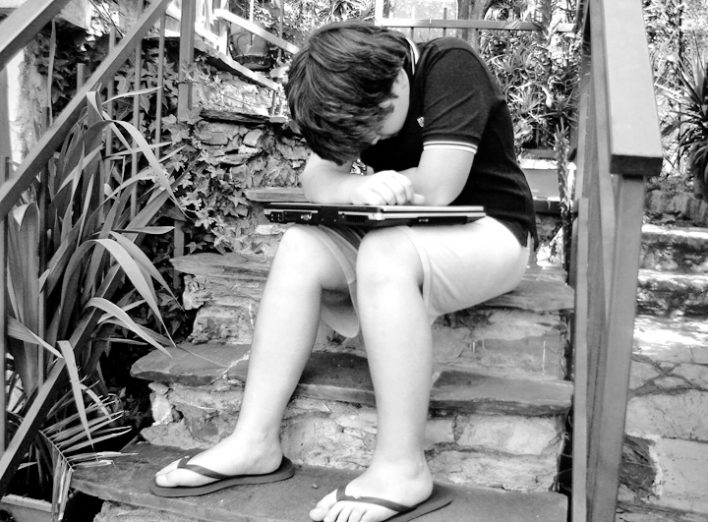By Marilyn Evans:
I’ve been thinking a lot about shame lately. And how it’s such a BIG obstacle for kids striving to let go of the compulsive habit to use porn. Shame floods the mind with negative thoughts and self-doubt. —”I’m no-good, I’m unlovable, I’m worthless, I’m stupid…” the list goes on.
To meet our young people in their crisis, we have learn to respond with an unconditional, no judgment, arms-open-wide, kind of love.
And that, my friends, is not always so easily done.
If you’ve got a youth who’s trying to kick the habit of porn, then I am going guess you’ve wondered how give constant support —especially when it seems your child keeps falling into the same negative routine.
In my own experience I’ve learned (the hard way) there are things we do while trying to help a child overcome a bad habit that may inadvertently increase their shame. Of course, when the heart is in the right place it covers many parenting blunders. But what if we could learn to avoid these shame traps altogether? Recovery from porn is within reach. Wouldn’t it be worth it, to offer our children an even better chance at success?
5 shame-inducing traps and how to repair them
1. Emotional responses
The trap: Let’s assume for a moment you weren’t the perfect parent (just imagine!). And you absolutely lost it when you discovered your child’s pornography habit. Maybe you shouted, cried, or even shook with fear —what do you mean, my baby’s been viewing that! If so, you’re not alone. Yet these common negative responses really only serve one purpose. They reinforce shame.
The repair: Fortunately, kids are usually very forgiving creatures! Once you’ve calmed down, tell your child you messed up and you would like to have the conversation again —this time the right way. Sharing your vulnerable side can go a long way to building trust.
When I first started this conversation with my kids I told them outright this was new territory for me. I warned them I might trip over my words at first. I asked them to be patient with me as I was learning to talk openly about the harms of pornography. Then I reminded them how important they are and how much I loved them.
2. Too much tough love
The trap: Along with the emotional freak-out another common parental response is to cut kids off from the internet. We get this crazy idea that we can build a fence big enough to keep trouble out. Again, the intention is good but the result is kids feel punished and the parent/child relationship suffers. In the end porn always finds a way back in.
The repair: Start by listening to your child’s needs. Ask them what they think could be done to help make using the internet a healthy experience. Talk to them about parental controls, accountability programs, internet filtering. Come up with practical solutions together. This will help your child know you’re on their team, with porn as the common enemy.
3. Rushing what can’t be rushed
The trap: Have you ever been tempted to say to your child, Just quit already? Or thought, we’ve had the talk; we’ve got a strategy in place; the problem is solved! The truth is your child will feel compelled to look at porn over and over again, even when they know it’s wrong and harmful to their own wellbeing. Pornography works on the brain like any other addiction. When kids want to quit but can’t, they feel horrible. Telling them to hurry up compounds negative feelings.
The repair: Remind yourself that recovery takes time. When setbacks occur, your child needs support more than ever. This is when they feel they least deserve to be loved. Tell them you are prepared to help them start over as many times as necessary. And that together you can beat this.
4. Stuck on setbacks
The trap: As a parent you wear many hats —counsellor, therapist, friend, etc. In crisis mode, it can be a difficult to recognize all the good stuff that’s happening in your child’s life. Of course there are times when you’ll need to talk about setbacks, identify triggers, and brainstorm healthier ways to deal with negative emotions. But if this becomes the main focus, your child may doubt they’re making any progress.
The repair: Remember that every victory is worth celebrating! One pro-active mom shared this experience with me:
We were having one of our regular accountability sessions. I could see my son had, had a few recent setbacks but I had a nagging feeling we needed a new approach. I turned to him and said, “You’ve had so many victories in the last few weeks. I am so proud of you!” His reaction was so tender. He burst into tears and told me, “I honestly thought I wasn’t making any progress. I feel like we only ever talk about the things I am doing wrong.”
In our eagerness to help a young person find full recovery, it’s so important we don’t overlook every incredible effort they make along the way.
5. Embarrassment
The trap: It’s so common to believe we have to keep our struggles with pornography a secret. We worry that speaking about its impact on our family means we will be judged harshly. But talking about pornography in hushed tones and keeping secrets adds to the stigma our youth already feel.
The repair: Recognize most families have been or will be impacted by pornography in some way or another. Confide in close friends or extended family. Find strength in your community. Call upon schools, churches and legislative officials to make this conversation a priority.
My parenting story (mistakes and all)
Pornography found its way into our home, beginning about 10 years ago. Three of my children have been exposed through hidden links in video games, inappropriate conversations on the playground, or stumbling across sexualized content via innocent internet searches. Porn targeted our kids at very young ages. Curiosity kept them coming back. Before long, compulsive habits were formed. My husband and I were unaware of what was happening; until one-by-one they each came to us looking for help to break free.
We were shocked (I can still feel my heart racing). How could this happen in our home? We had taught our children to love God, respect their body, and most of all respect others. Eventually I learned that the pull to look at porn is so strong that anyone can fall prey to its grasp —even good kids.
Then I got all mamma-bear and started looking for ways to fight this monster that was threatening to destroy the future happiness of my children. With the best intentions, I started out —and made tons of mistakes!
Overcoming pornography is long road to travel. It’s full of twists and turns, ups and downs. Youth need parents who are willing to make that journey with them —unconditionally and without shame.
 Marilyn Evans is founder of ParentsAware.info an organization dedicated to helping families have solution focused discussions about pornography. Marilyn has an educational background in family communications and believes that even the most difficult conversations can be made easy. She loves to share her own experience and fascinating conversations with other parents via her blog, and live speaking presentations. Marilyn lives east of Toronto with her husband and five sons. You can follow Marilyn on Facebook, Twitter and Instagram
Marilyn Evans is founder of ParentsAware.info an organization dedicated to helping families have solution focused discussions about pornography. Marilyn has an educational background in family communications and believes that even the most difficult conversations can be made easy. She loves to share her own experience and fascinating conversations with other parents via her blog, and live speaking presentations. Marilyn lives east of Toronto with her husband and five sons. You can follow Marilyn on Facebook, Twitter and Instagram

